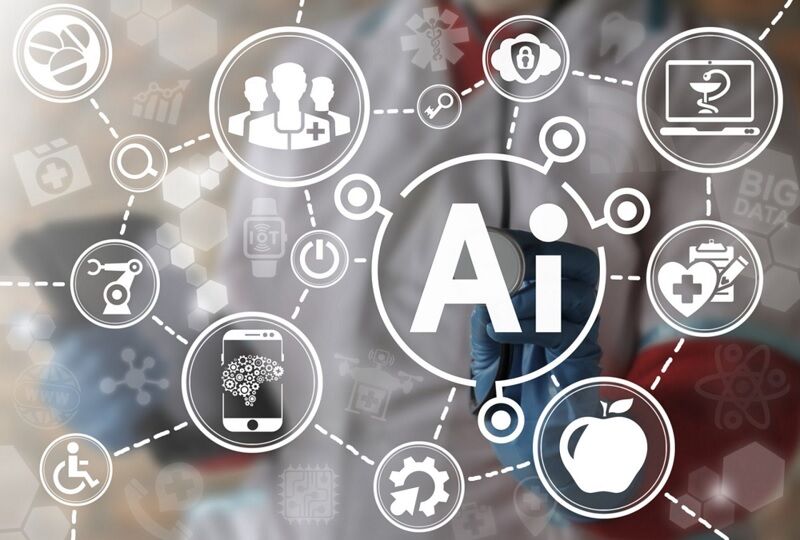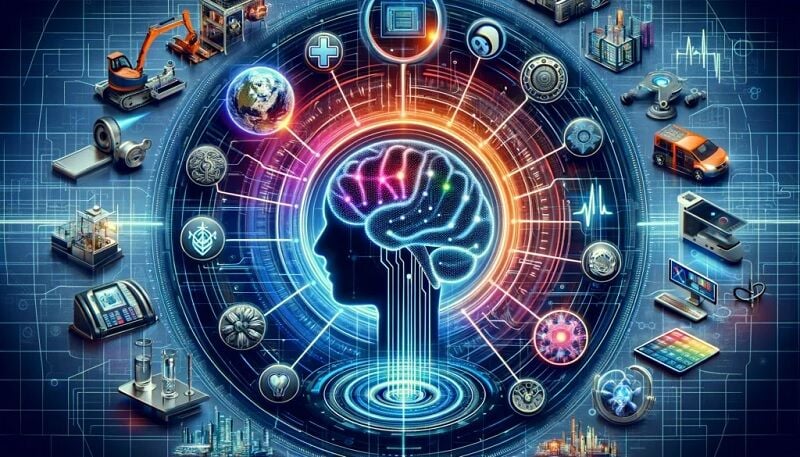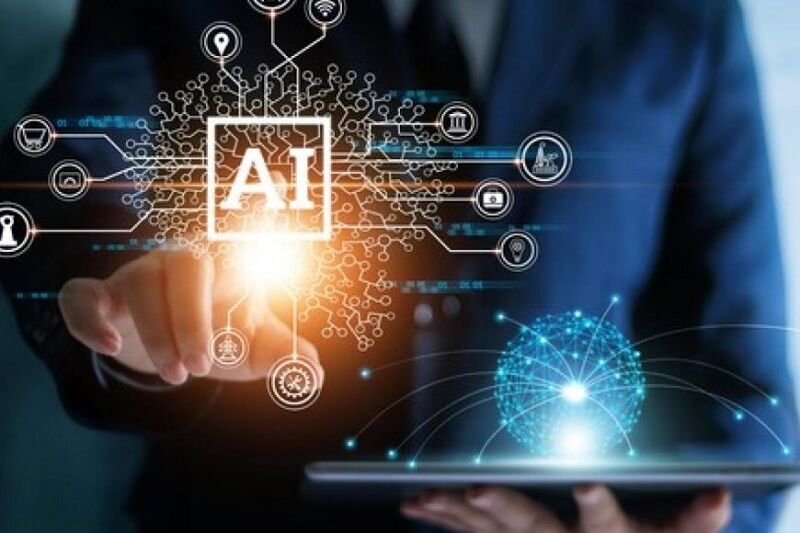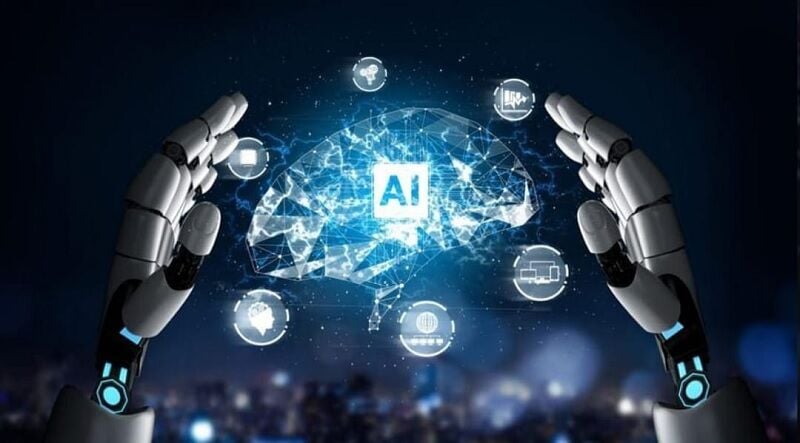The impact of artificial intelligence on various industries

Artificial Intelligence (AI) is not merely confined to futuristic paradigms; it serves as a transformative force that is currently reshaping myriad industries worldwide. Ranging from retail to healthcare, the potent capabilities of AI are optimising workflows, anchoring digital objectives, and hastening automation. But what precisely constitutes the impact of AI across diverse sectors? Let us probe this compelling topic.
The retail industry exemplifies one sector where AI’s influence is notably profound. However, its impact extends beyond this domain. Creative industries, financial services, and even healthcare are exploiting the power of AI to revolutionise their operations. Whether it involves enhancing employee skills, identifying fraudulent activities or augmenting diagnostic procedures, AI leaves an indelible imprint.
Nevertheless, a recurrent theme emerges – a deficiency in both knowledge about and talent for AI. How can businesses surmount these obstacles to truly capitalise on the advantages offered by AI? We shall explore this question along with other related issues as we dissect the universal application of this revolutionary technology.
The function of artificial intelligence across various industries

Delving into the realm of artificial intelligence reveals its transformative power across a wide range of sectors. It is augmenting daily procedures, optimising outcomes, and redefining boundaries of possibility. The influence of artificial intelligence on numerous industries represents an amalgamation of sophisticated algorithms, data-centric strategies, and audacious innovation. Let us scrutinise particularities and analyse how AI is instigating revolutionary changes in sectors such as healthcare, retail finance, and manufacturing.
AI in healthcare revolutionising patient care
In the healthcare sector, the advent of AI heralds a new dawn. It’s catalysing a paradigm shift in everything: diagnostics, drug discovery, and even patient care. AI’s potential in parsing vast medical datasets, recognizing patterns, and making precise predictions squarely places it at the forefront of medical innovation. For instance, intricate AI models assist clinicians in detecting anomalies in scans, thereby expediting diagnosis. Moreover, machine learning applications facilitate drug discovery by predicting how different compounds interact, saving time on lab testing.
AI in retail transforming shopping experiences
The retail and e-commerce space isn’t immune to AI’s transformative touch. AI is elevating shopping to an unprecedented, personalised level. It’s all about optimising inventory management and recommending products finely tailored to consumer preferences. Complex AI algorithms analyse customer behaviour and past purchases to suggest items that customers may enjoy. It’s a win-win, consumers discover new products they love, and businesses boost their sales and customer loyalty.
AI in finance enhancing precision and security
AI’s inroads into the financial sector spell more precision and heightened security. Primarily, AI refines automation, sharpens fraud detection mechanisms, and advances predictive analytics. High-frequency trading, fed by AI algorithms, gives firms an edge in managing vast financial markets. Additionally, AI’s ability to meticulously scrutinise transaction details boosts fraud detection, bolstering confidence in digital transactions.
Artificial intelligence in manufacturing promotes efficacy and advancement
Artificial Intelligence is not confined to enhancing the service-oriented sectors, it’s also inducing a significant transformation in the manufacturing industry. It optimises manufacturing procedures and initiates an unprecedented degree of productivity. AI expedites diverse operations ranging from quality assurance to predictive upkeep. Intelligent factories, enabled by AI, adjust promptly to alterations, promoting efficiency and encouraging innovation. Amid escalating competition and diminishing margins, AI emerges as an essential apparatus for maintaining agility and minimising expenses while upholding superior quality standards.
The fundamental advantages and challenges of artificial intelligence in commercial enterprises

Artificial Intelligence offers substantial benefits that assist in optimising operational procedures, advancing client interactions, and escalating profit margins. To illustrate this point, take Netflix as an example. With a user base exceeding 100 million subscribers, Netflix utilises an AI algorithm to individualise recommendations for its consumers. This not only augments the search results for its audience but also minimises the likelihood of subscription terminations due to dissatisfaction stemming from an inability to locate the desired content. A success such as this has the potential to influence Netflix’s annual revenue by approximately one billion dollars.
A further endorsement of the potency of AI is evident in Bloomberg’s application, a globally recognised leader in financial data provision. By leveraging AI methodologies like computer vision and natural language processing, they have succeeded in broadening the scope of information available on their terminals- a primary resource financial staff depend upon for market data access. Integration with AI empowers users to utilise natural language queries, marking considerable progress from earlier reliance on specialised technical commands.
Challenges and ethical considerations
Of course, the AI journey doesn’t come without bumps on the road. The ‘AI Adoption’ road map requires dealing with a series of challenges. Ethical considerations top the chart in this segment. Technologies like AI hold immense power, but when misused, such technology can cause more damage than good. It remains the duty of every organisation leveraging AI to do so ethically and responsibly.
Issues around data privacy and security pose significant challenges. While AI thrives on data, it needs to ensure the safeguarding of that very data from theft and misuse.
Integration hurdles also exist as moving legacy systems onto a new tech framework isn’t an easy task. It requires efficient planning, accurate strategy, and persistent effort. Also, the transition to AI might not always be financially viable for all businesses.
In short, businesses strive to maximize the potential of AI while at the same time diligently treading the ethical and practical challenges that come alongside it.
Forthcoming progressions in artificial intelligence

In the process of examining the influence of Artificial Intelligence (AI) across various sectors, it becomes crucial to gaze into what’s ahead. Let us embark on a detailed analysis of predicted advancements and applications about AI in the forthcoming future.
AI Plays a Pivotal Role in Data Analysis
Data forms the backbone of decision-making across all sectors. AI is set to revolutionise this area further, with advanced analytics, lending precision to prognosis, crafting of targeted solutions, and maximising resources.
Increased Reliance on AI for Automation
Automation serves as a catalyst for operational efficiency across a myriad of industries. With AI, expect to see smart machinery, factories, and homes getting smarter, offering optimised productivity and energy consumption.
The Pervasion of Artificial Intelligence in Daily Routine
Having already made significant progress in areas such as voice search, digital assistants, and personalised suggestions, the continued evolution of AI is expected to infiltrate various aspects of daily existence. With its potential to augment connectivity, fitness, and nutrition as well as revolutionising commuting methods, entertainment offerings and retail experiences, the objective of AI remains centred around facilitating a more effortless life.
Utilisation of artificial intelligence for advanced cybersecurity
In an epoch where data transgressions and cyber threats are ubiquitous occurrences, artificial intelligence emerges with potentiality as a future-proof defensive measure. It would be prudent to expect AI-driven systems that possess capabilities for real-time threat identification and immediate response mechanisms along with predictive faculties; all these considerably enhancing efforts towards cybersecurity.
Forthcoming progressions in artificial intelligence
In the process of examining the influence of Artificial Intelligence (AI) across various sectors, it becomes crucial to gaze into what’s ahead. Let us embark on a detailed analysis of predicted advancements and applications of AI in the forthcoming future.
Greetings, have you observed the transformative effect of Artificial Intelligence (AI) across diverse fields? From healthcare and retail to finance and manufacturing, AI is inducing significant changes. It’s enhancing our work efficiency and yielding superior outcomes – a truly remarkable development.
Noteworthy enterprises such as Netflix and Bloomberg are also embracing the opportunities presented by AI to augment their revenue streams and simplify data management. However, it is crucial to acknowledge that any substantial advancement comes with associated challenges. We face complex issues related to ethics, data privacy apprehensions, security risks, and the integration of this novel technology into our existing systems.
Nonetheless, rest assured that the future trajectory of AI appears highly promising with a plethora of innovative trends emerging. Anticipate more robust data analysis tools, enhanced automation capabilities for increased ease of use, and improved cybersecurity measures for reinforced online safety, alongside an increasing focus on ethical considerations in AI development.
It is undeniable: The influence of AI across various industries will continue to expand. Therefore, prepare yourself for an exhilarating progression ahead driven by sophisticated AI methodologies.
Want to no more, The silent partner in our digital development. In the grand scheme of global events, the advent of Artificial Intelligence (AI) stands as a monumental milestone. Indeed, AI’s tendrils reach far and wide, influencing myriad aspects of our daily lives. From the way we work to how we play, AI’s impact is undeniable, weaving a complex tapestry of technological triumphs across the globe.
Latest Thailand News
Follow The Thaiger on Google News:


























